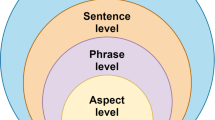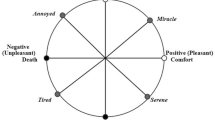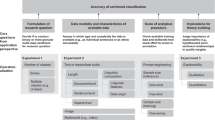Abstract
Considering the diversities and ambiguities of opinion expressions in Chinese online product reviews, normal sentiment analysis technologies have exposed their inadequateness in both classification accuracy and identifying effectiveness. We propose a novel approach which can easily identify product features and corresponding opinions by building a domain-specific affective ontology and thus mapping comment sentences to the objects defined in the affective ontology. Ontology is created automatically by processing the online reviews; both product features and affective words are presented as nodes which are connected to each other by their semantic relationship. Furthermore, in order to increase the accuracy, we introduce a dynamic polarity detection technique for affective words whose sentimental tendencies are dependent on particular contexts. The experimental results clearly demonstrate the performance improvement of our approach compared with others in real world online product reviews for classification tests.
Similar content being viewed by others
References
Hu M Q, Liu B. Mining and summarizing customer reviews [C]//Proceedings of the Tenth ACM SIGKDD International Conference on Knowledge Discovery and Data Mining. Seattle, Washington, USA: ACM, 2004: 168–177.
Pang B, Lee L. Opinion mining and sentiment analysis [J]. Foundations and Trends in Information Retrieval, 2008, 2(1–2): 1–135.
Kessler J S, Nicolov N. Targeting sentiment expressions through supervised ranking of linguistic configurations [C]//Proceedings of the Third International ICWSM Conference. [s.l.]: ICWSM, 2009: 90–97.
Zhang L, Liu B. Extracting resource terms for sentiment analysis [C]//Proceedings of the 5th International Joint Conference on Natural Language Processing. Chiang Mai, Thailand: [s.n.], 2011: 1171–1179.
Eirinaki M, Pisal S, Singh J. Feature-based opinion mining and ranking [J]. Journal of Computer and System Sciences, 2012, 78(4): 1175–1184.
Zhuang L, Jing F, Zhu X Y. Movie review mining and summarization [C]//Proceedings of the 15th ACM International Conference on Information and Knowledge Management. [s.l.]: ACM, 2006: 43–50.
Archak N, Ghose A, Ipeirotis P G. Show me the money! Deriving the pricing power of product features by mining consumer reviews [C]//Proceedings of the 13th ACM SIGKDD International Conference on Knowledge Discovery and Data Mining. San Jose, California, USA: ACM, 2007: 56–65.
Blair-Goldensohn S, Hannan K, McDonald R, et al. Building a sentiment summarizer for local service reviews [C]//Proceedings of the 17th International Conference on World Wide Web (NLPIX2008). Beijing, China: ACM, 2008: 14–23.
Wu Y B, Zhang Q, Huang X J, et al. Phrase dependency parsing for opinion mining [C]//Proceedings of the 2009 Conference on Empirical Methods in Natural Language Processing. Singapore: Association for Computational Linguistics, 2009: 1533–1541.
Qiu G, Liu B, Bu J J, et al. Opinion word expansion and target extraction through double propagation [J]. Computational Linguistics, 2011, 37(1): 9–27.
Bross J, Ehrig H. Automatic construction of domain and aspect specific sentiment lexicons for customer review mining [C]//Proceedings of the 22nd ACM International Conference on Information & Knowledge Management. San Francisco, CA, USA: ACM, 2013: 1077–1086.
Kaji N, Kitsuregawa M. Building lexicon for sentiment analysis from massive collection of HTML documents [C]//Proceedings of the 2007 Joint Conference on Empirical Methods in Natural Language Processing and Computational Natural Language Learning. Prague: Association for Computational Linguistics, 2007: 1075–1083.
Mohammad S, Dunne C, Dorr B. Generating highcoverage semantic orientation lexicons from overtly marked words and a thesaurus [C]//Proceedings of the 2009 Conference on Empirical Methods in Natural Language Processing. Singapore: Association for Computational Linguistics, 2009: 599–608.
Rao D, Ravichandran D. Semi-supervised polarity lexicon induction [C]//Proceedings of the 12th Conference of the European Chapter of the Association for Computational Linguistics. Athens, Greece: Association for Computational Linguistics, 2009: 675–682.
Esuli A, Sebastiani F. Sentiwordnet: A publicly available lexical resource for opinion mining [J]. Proceedings of LREC, 2006, 6: 417–422.
Wilson T, Wiebe J, Hoffmann P. Recognizing contextual polarity in phrase-level sentiment analysis [C]//Proceedings of the Conference on Human Language Technology and Empirical Methods in Natural Language Processing. [s.l.]: Association for Computational Linguistics, 2005: 347–354.
Dong Zhen-dong, Dong Qiang. HowNet [EB/OL]. (1999-01-01). http://www.keenage.com (in Chinese).
Wei W, Gulla J A. Sentiment learning on product reviews via sentiment ontology tree [C]//Proceedings of the 48th Annual Meeting of the Association for Computational Linguistics. Uppsala, Sweden: Association for Computational Linguistics, 2010: 404–413.
Zhou L, Chaovalit P. Ontology-supported polarity mining [J]. Journal of the American Society for Information Science and Technology, 2008, 59(1): 98–110.
Lau R, Song D, Li Y, et al. Toward a fuzzy domain ontology extraction method for adaptive e-learning [J]. IEEE Transactions on Knowledge and Data Engineering, 2009, 21(6): 800–813.
Lau R Y K, Lai C C L, Ma J, et al. Automatic domain ontology extraction for context-sensitive opinion mining [J]. Proceedings of Thirtieth International Conference on Information Systems. Phoenix: ICIS, 2009: 35–53.
Che W X, Li Z H, Liu T. Ltp: A chinese language technology platform [C]//Proceedings of the 23rd International Conference on Computational Linguistics (Demonstrations). Beijing, China: Association for Computational Linguistics, 2010: 13–16.
Author information
Authors and Affiliations
Corresponding author
Additional information
Foundation item: the National Natural Science Foundation of China (Nos. 61303105 and 61402304), the Humanity & Social Science General Project of Ministry of Education (No. 14YJAZH046), the Beijing Natural Science Foundation (No. 4154065), the Beijing Educational Committee Science and Technology Development Plan (No. KM201410028017) and the Academic Degree Graduate Courses Group Projects
Rights and permissions
About this article
Cite this article
Liu, Lz., Liu, H., Wang, Hs. et al. Generating domain-specific affective ontology from Chinese reviews for sentiment analysis. J. Shanghai Jiaotong Univ. (Sci.) 20, 32–37 (2015). https://doi.org/10.1007/s12204-015-1584-0
Received:
Published:
Issue Date:
DOI: https://doi.org/10.1007/s12204-015-1584-0




